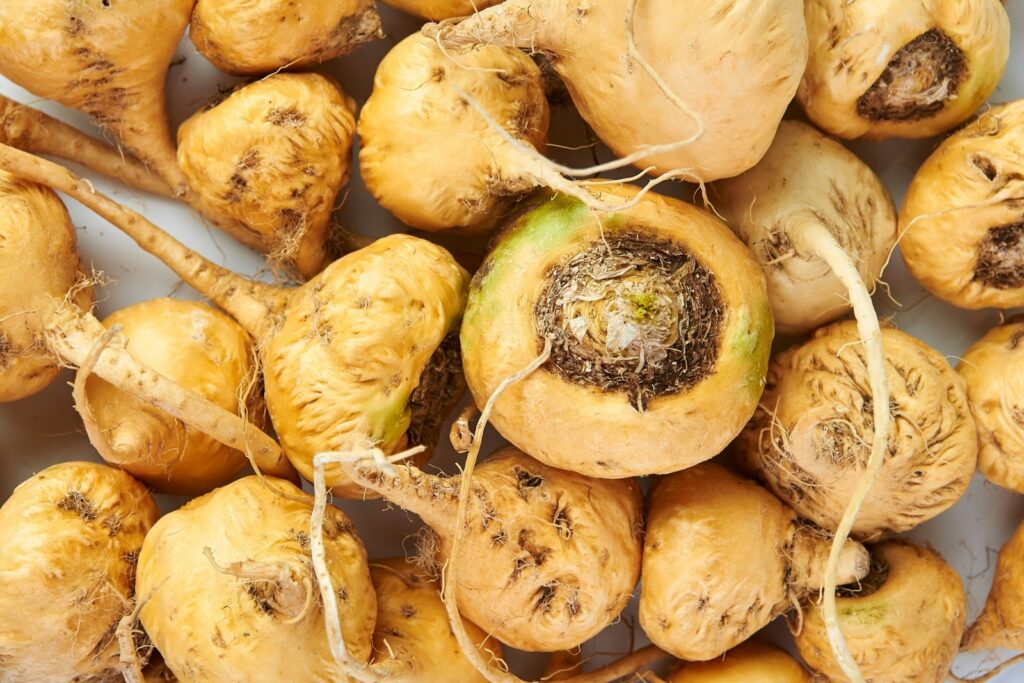Maca, a root vegetable native to the high Andes of Peru, has been used for centuries as a natural remedy for improving energy, stamina, fertility, and overall health. Known scientifically as Lepidium meyenii, maca is sometimes called “Peruvian ginseng” due to its adaptogenic properties, though it is not a true ginseng. Despite its long history, maca has only gained widespread recognition in the last few decades, particularly as a supplement for energy and hormone balance. But maca offers much more than just these benefits. This ancient superfood has earned its place in modern wellness practices, with research supporting its numerous health benefits, ranging from enhanced athletic performance to improved sexual health and mental clarity. In this blog, we will explore the history, nutritional benefits, uses, and potential health advantages of maca, providing you with a comprehensive guide to this remarkable root.
What is Maca?
Maca is a root vegetable that belongs to the Brassicaceae family, which also includes broccoli, kale, and cabbage. It grows at high altitudes in the Andes mountains of Peru, where it has been cultivated for over 2,000 years. Maca is known for its ability to survive in extreme conditions, with temperatures that can drop below freezing, high UV radiation, and low oxygen levels. The root itself is typically harvested in the fall after it has been grown for around 9 months, and it can be found in a variety of colors, including yellow, red, and black. Each type of maca has slightly different properties, though they all share the same general health benefits.
Maca has traditionally been used by indigenous Peruvian cultures for various purposes, including enhancing energy, improving sexual function, and increasing fertility. It was also believed to enhance endurance and stamina, which made it a popular food for warriors before battle. In modern times, maca is most commonly consumed in powder form or as capsules, making it easy to incorporate into the diet as a supplement.
Nutritional Profile of Maca
Maca is a powerhouse of nutrients, packed with vitamins, minerals, and essential amino acids that contribute to its many health benefits. Here’s a closer look at the key nutrients found in maca:
- Carbohydrates: Maca is a good source of complex carbohydrates, providing sustained energy. It contains fiber, which aids digestion and helps maintain healthy blood sugar levels.
- Proteins: It contains all eight essential amino acids, making it a complete protein. These amino acids play crucial roles in muscle repair, immune function, and overall health.
- Vitamins and Minerals: Maca is rich in B-vitamins, especially B1 (thiamine), B2 (riboflavin), B6 (pyridoxine), and folate, all of which are vital for energy production, metabolism, and healthy cell function. Maca also contains minerals such as calcium, magnesium, iron, zinc, and potassium, all of which are essential for various bodily functions, including bone health, immune function, and muscle function.
- Phytonutrients: Maca contains plant compounds like glucosinolates and polyphenols, which have antioxidant properties that help protect cells from oxidative stress and inflammation.
This nutrient-dense profile makes maca a great addition to a balanced diet, particularly for those who need a natural energy boost, mental clarity, or hormone balance.
Health Benefits of Maca
Maca’s potential health benefits are diverse, and scientific research has started to uncover how this ancient root can improve various aspects of health. Here are some of the most significant benefits of maca:
1. Boosts Energy and Stamina
Maca is best known for its ability to increase energy levels and improve stamina. Many people turn to maca when they feel fatigued or drained, as it offers a natural energy boost without the crash that comes from caffeine or energy drinks. Maca is an adaptogen, meaning it helps the body respond to stress and restore balance. It is particularly beneficial for those experiencing fatigue due to chronic stress, physical exertion, or lack of sleep. Athletes and fitness enthusiasts often use maca to enhance performance, improve endurance, and speed up recovery times.
Studies have shown that maca can improve exercise performance by increasing energy levels and stamina. This is particularly true when it comes to aerobic exercises and endurance activities, where maca may help individuals push past their limits and improve their athletic performance.
2. Enhances Sexual Health and Libido
Maca has a long history of use as an aphrodisiac, and modern research supports its reputation for improving sexual health and libido. Both men and women can benefit from maca’s ability to enhance sexual desire and performance. Several studies have shown that maca can increase libido and improve sexual function, particularly in individuals with low sex drive or those experiencing sexual dysfunction due to stress, medication, or hormonal imbalances.
For men, maca has been shown to increase sperm count, motility, and overall fertility. It may also support prostate health and reduce symptoms associated with erectile dysfunction. Women may experience better hormonal balance and relief from symptoms related to menopause, such as hot flashes and mood swings. Maca works by balancing hormones naturally, without the need for synthetic hormones or medications, making it an excellent option for improving sexual health in a safe and natural way.
3. Improves Mood and Reduces Anxiety
Maca has adaptogenic properties that help the body manage stress more effectively, which can lead to an improvement in mood and a reduction in anxiety. Many people report feeling more relaxed, calm, and mentally clear after taking maca regularly. It can help alleviate symptoms of anxiety, depression, and mood swings, especially in individuals who are experiencing stress or hormonal imbalances.
The root also supports healthy adrenal function, which plays a key role in managing the body’s stress response. By supporting the adrenal glands and regulating cortisol levels (the primary stress hormone), maca can help individuals feel more balanced and resilient in the face of stress.
4. Balances Hormones
Maca is particularly beneficial for those experiencing hormonal imbalances, whether due to menopause, pregnancy, or other factors. It supports the endocrine system by helping to regulate hormone levels, particularly estrogen and progesterone in women and testosterone in men.
For women, maca can help alleviate symptoms of menopause, such as hot flashes, night sweats, and mood swings. It may also regulate menstrual cycles and reduce symptoms of premenstrual syndrome (PMS). In men, maca can help balance testosterone levels, which may enhance fertility and sexual health.
Maca’s ability to balance hormones naturally makes it a popular choice for those seeking a more holistic approach to hormone regulation without the side effects of pharmaceutical drugs.
5. Improves Memory and Mental Clarity
In addition to its physical benefits, maca is also known for its ability to enhance mental clarity, focus, and cognitive function. It has been shown to improve memory and reduce mental fog, making it a great supplement for students, professionals, or anyone needing to stay sharp and focused. Maca can increase oxygen levels in the brain, which improves cognitive function and reduces feelings of fatigue or mental exhaustion.
By supporting brain health and improving memory, maca may also help reduce the risk of cognitive decline in older adults, contributing to long-term brain health.
6. Supports Bone Health
Maca is a good source of calcium, magnesium, and zinc, all of which are vital for maintaining healthy bones. It can help improve bone density, particularly in postmenopausal women who are at higher risk for osteoporosis. Studies have shown that maca can increase bone strength and may help prevent bone loss by supporting the body’s natural processes of bone formation and mineralization.
7. Promotes Skin Health
Maca’s antioxidant properties can help protect the skin from oxidative stress and inflammation, which can lead to premature aging and skin damage. Maca may help improve skin tone, reduce acne, and support collagen production, leading to smoother and more youthful-looking skin. The presence of zinc in maca also contributes to skin health by promoting wound healing and reducing inflammation.
How to Use Maca
Maca is available in a variety of forms, including powder, capsules, liquid extracts, and maca-based products. The most common form of maca is powder, which can be easily added to smoothies, oatmeal, baked goods, or other recipes. The recommended dosage of maca varies depending on the form and individual needs, but most people take between 1,500 and 3,000 mg of maca per day, either in one dose or divided throughout the day.
It’s best to start with a lower dose and gradually increase it as needed, allowing your body time to adjust. If you’re unsure about how much maca to take, it’s always a good idea to consult with a healthcare provider to ensure you’re taking the right amount for your health goals.
Conclusion
Maca is a powerful, nutrient-dense root with a wide range of health benefits, from boosting energy and stamina to supporting hormone balance and improving sexual health. Its adaptogenic properties make it an excellent choice for managing stress, enhancing mood, and improving cognitive function. Whether you’re an athlete looking for improved performance or someone seeking a natural way to balance hormones and improve overall health, maca can be a valuable addition to your wellness routine. As with any supplement, it’s important to use maca responsibly and consult a healthcare provider if you have any concerns or underlying health conditions. With its rich history and impressive array of benefits, maca continues to be one of the most popular superfoods for supporting both physical and mental well-being.

